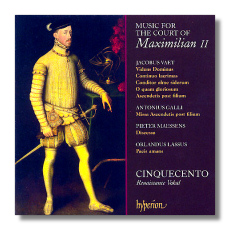
The Internet's Premier Classical Music Source
Related Links
- Latest Reviews
- More Reviews
-
By Composer
-
Collections
DVD & Blu-ray
Books
Concert Reviews
Articles/Interviews
Software
Audio
Search Amazon
Recommended Links
Site News
 CD Review
CD Review
Music for the Court of Maximilian II

- Jacobus Vaet:
- Motet "Videns Dominus" for 5 Voices
- Motet "Conditor alme siderum" for 4/56 Voices
- Motet "O quam gloriosum" for 4 Voices [2'18]
- Motet "Ascendetis post filium" (In laudem Invictiss. Rom. Imp. Max. II) for 6 Voices
- Motet "Continuo lacrimas" (In mortem Clementis non Papae) for 6 Voices
- Antonius Galli: Missa Ascendetis post filium for 6 Voices
- Pieter Maessens: Motet "Discessu" for 6 Voices
- Orlandus Lassus: Motet "Pacis amans" for 6 Voices
Cinquecento
Hyperion CDA67579 68m DDD
This disc is not only timely but also most welcome as for some unknown reason, the music of the early Austrian Hapsburg Imperial Court has not received the kind of attention it deserves.
Although Maximillian II reigned as Holy Roman Emperor for just 12 years, from 1564 to 1576, a large number of composers contributed countless pieces for the Emperor's many functions, both sacred and secular.
This CD includes works by four significant composers who wrote a myriad of sacred compositions for the Emperor's court, but of these Jacobus Vaet (c. 1529-1567) is by far the most important.
Maximillian was a patron to Vaet, and their relationship was close. Many of the texts of Vaet's motets are addressed to the Emperor, who on his part recorded Vaet's death most poignantly in his diary. The 'Missa Ascendetis post filium' by Antonius Galli (d. 1565) is modelled on one of Vaet's motets, but although beautiful moments abound, it is not as memorable.
Orlandus Lassus (1532-1594) and Pieter Maessens (c1505-1562) are each represented by a short, rather insignificant piece. This is Cinquecento's debut recording, an all-male ensemble which promises to rival the best of their kind in the choral scene. Indeed these are thrilling, exhilarating performances which should go a long way towards establishing this repertoire on a sounder footing. Worth buying, if only for Vaet's masterly motets.
Copyright © 2007, Gerald Fenech




















